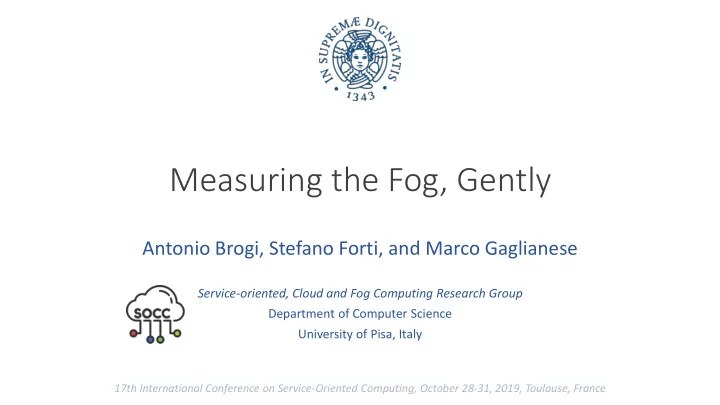

Measuring the Fog, Gently Antonio Brogi, Stefano Forti, and Marco Gaglianese Service-oriented, Cloud and Fog Computing Research Group Department of Computer Science University of Pisa, Italy 17th International Conference on Service-Oriented Computing, October 28-31, 2019, Toulouse, France
CONTINUOUS IOT GROWTH Drones for Energy Smart Cities Embedded AI Autonomous deliveries production driving 2
LARGE HIGHLY DISTRIBUTED SOFTWARE SYSTEMS multi-component osmotic microservices 3
PERVASIVELY DISTRIBUTED INFRASTRUCTURES cloud micro-cloud fog edge mist IoT 4
STRINGENT QoS REQUIREMENTS 5
How to adaptively manage LARGE HIGHLY DISTRIBUTED SOFTWARE SYSTEMS on top of PERVASIVELY DISTRIBUTED INFRASTRUCTURES so so to o guarantee their STRINGENT QoS REQUIREMENTS ? 6
Fog og Orch chestratio ion La Layer • First proposed by Bonomi et al. in 2014 • Since then: • Much work* to cover Analyse • Some work for Plan and Execute • Few work on Monitor • Monitor is important to decide: 1. where to deploy app services at first 2. when/where to migrate app services * A. Brogi, S. Forti, C. Guerrero, I. Lera. "How to Place Your Apps in the Fog-State of the Art and Open Challenges." Software Practice and Experience (In Press)
Chall llenges in in Fog og Mon onit itorin ing heterogeneous & unstable failures resource-constrained Internet and churn devices connectivity
Rela lated Wor ork: Fog og Mon onit itorin ing To the best of our knowledge, none target all three challenges.
Our Proposal A lightweight fault-resilient monitoring technique for Fog infrastructures, prototyped in an open-source tool https://github.com/di-unipi-socc/FogMon
metr tric ics The prototype monitors: - Hardware resources availability - CPU, RAM, HDD - End-to-end (e2e) network QoS - latency and bandwidth - Connected IoT devices
ar arch chit itectu ture Two types of distributed P2P agents: • Followers measuring monitored metrics, and • Leaders aggregating metrics from a group of Followers, and gossiping them to other Leaders
Foll llower Latency-aware Leader selection
Le Leader • Leaders collect measurements from Followers in their groups. • Leaders spread data to other Leaders via Gossiping • 𝑃(log 𝑀) rounds to spread information on avg • 𝑃(𝑀 log 𝑀) messages exchanged overall
Meas asurin ing Har ardware an and IoT IoT • Hardware capabilities (CPU,RAM,HDD) • Hyperic Sigar API • IoT devices connected via serial port (USB & Bluetooth) • libserialport tool ( iThing and iIoTDiscoverer )
Meas asurin ing La Latency ICMP via ping for intra-group and leader-to-leader measurements Inter-groups ℓ 𝐵,𝐶 ≃ ℓ 𝐵,𝑀1 + ℓ 𝑀1,𝑀2 + ℓ 𝑀2,𝐶 assuming Leader-Leader latency is higher than Leader-Follower latency
Meas asurin ing Ban andwidth • Intrusive measurements • Passive techniques • Iperf3 • Assolo T1 T2 T2 Congestion Inter-groups: 𝛾 𝐵,𝐶 ≃ min 𝑙,ℎ max 𝛾 𝐵,𝑙 , max 𝛾 𝐶,ℎ
Fau ault lt-tolerance an and Sc Scala labil ilit ity Fault-tolerance Scalability • Data replication at Leaders • 𝑂 nodes, 𝑀 leaders guarantees tolerance wrt some 𝑂 • 𝑀 nodes per group (per Leader) Leader failures. 𝑂 2 • Followers rearrange into other • 𝑀 2 e2e measurements for bw groups when their Leader fails. and latency • Groups keep working in case of 𝑂 2 • If 𝑀 ≃ 𝑂 then 𝑃 = 𝑃(𝑂) network interruption between 2 𝑂 Leaders. e2e measurements.
Testb tbed • 12 heterogeneous nodes • Heterogenous Internet Access: • ADSL 7/1, • VDSL 70/20, • VDSL 20/3, • FiberLAN • micro:bit IoT devices
Performance • Measurement error intra-group: • Latency & bandwidth bound by 5% • Avg measurement error inter-group: • Latency: 14% • Bandwidth: 18% <2% CPU <3 MB of RAM <5% bandwidth usage
Fog infrastructure Open-source monitoring prototype techniques Conclusio Co ions Lightweight, fault- Leader election & & tolerant and scalable mechanisms Futu ture Wor ork further Improve network experimental QoS estimates assessment
Measuring the Fog, Gently Antonio Brogi, Stefano Forti and Marco Gaglianese Service-oriented, Cloud and Fog Computing Research Group Department of Computer Science University of Pisa, Italy https://github.com/di-unipi-socc/FogMon 17th International Conference on Service-Oriented Computing, October 28-31, 2019, Toulouse, France
Recommend
More recommend